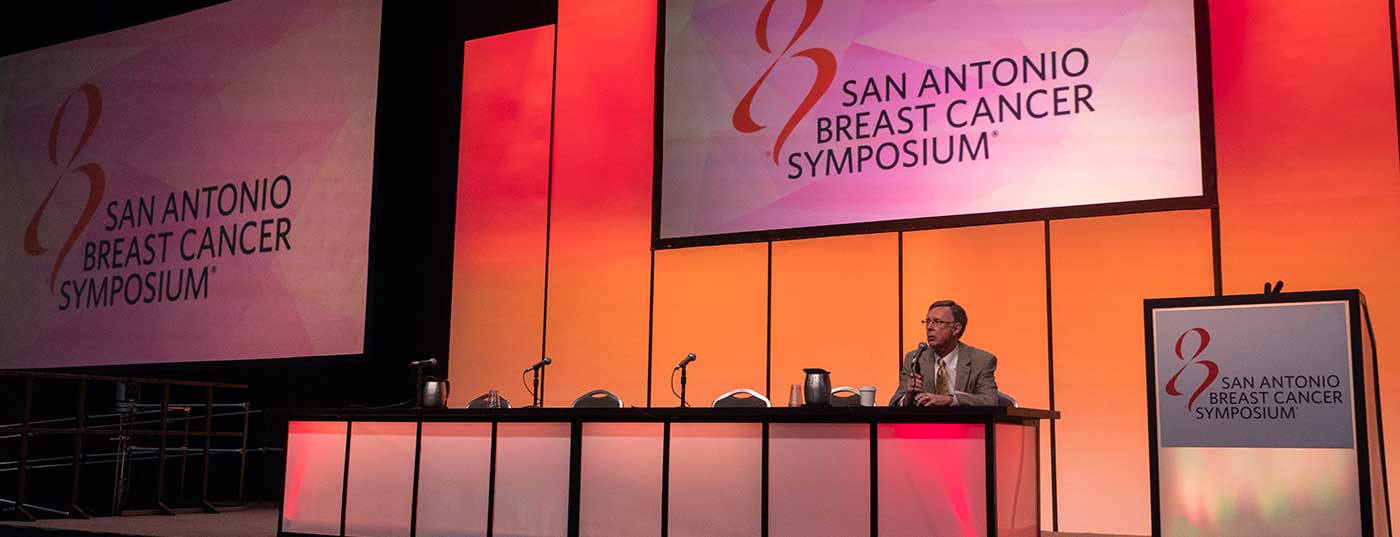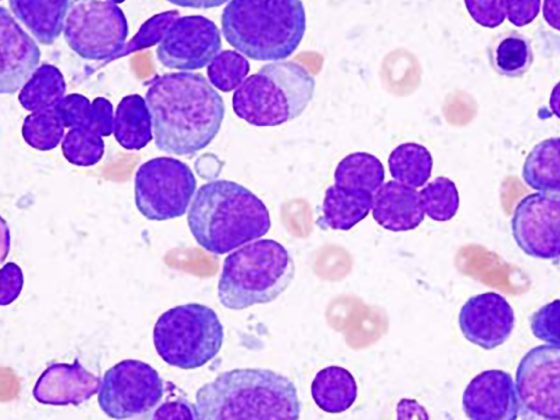New evaluations of the GeparSepto trial were presented at the San Antonio Breast Cancer Symposium. In this study, nab-paclitaxel is compared with solvent-containing paclitaxel as part of the neoadjuvant treatment of operable or locally advanced primary breast cancer. The data presented again clearly demonstrate that a reduced dose of 125 mg/m2 nab-paclitaxel is most effective and better tolerated. Furthermore, PIK3CA mutations appear to be predictive of treatment resistance in HER2-positive tumors. Patients with triple-negative carcinomas and poor benefit-risk profile under anthracycline-containing regimens are given hope by the ADAPT TN trial: taxane combined with carboplatin allows good response rates with relatively low toxicity in this group.
Nab-paclitaxel (Abraxane®) is a solvent-free protein-bound form of paclitaxel with a better safety profile and shorter infusion time while providing higher dosing and tumor-drug concentration. At the 2014 San Antonio Breast Cancer Symposium, it was shown that in patients with early breast cancer, the rate of pathological complete response (pCR = ypT0/ypN0) can be significantly improved by replacing solvent-containing paclitaxel with nab-paclitaxel in neoadjuvant chemotherapy. In December 2015, new evaluations of the GeparSepto trial were presented showing that nab-paclitaxel at the reduced dose of 125 mg/m2 provides a better benefit-risk ratio than nab-paclitaxel 150 mg/m2.
Dose reduction useful
In GeparSepto, 1206 participants were randomized to either the 150 mg/m2/week nab-paclitaxel group or the 80 mg/m2/week solvent-based paclitaxel group. The drug was administered once weekly for twelve weeks, followed by four cycles of epirubicin/cyclophosphamide every three weeks. Untreated, histologically confirmed, unilateral or bilateral primary breast carcinoma (cT2-cT4d) was the inclusion criterion, and clinically relevant cardiovascular or other comorbidities were not allowed. Patients with HER2-positive tumors received concurrent trastuzumab plus pertuzumab.
After an interim analysis showed that nab-paclitaxel at the dose of 150 mg/m2 resulted in more treatment discontinuations and dose reductions, the weekly dose was reduced to 125 mg/m2. Because the 229 patients who received the higher-dose agent were comparable to the 377 lower-dose participants and those on solvent-containing paclitaxel, the adjustment was taken as an opportunity to compare safety and efficacy:
- The pCR was lower with the higher dose (33.6%) than with the reduced dose (41.4%). In the solvent-containing paclitaxel group, the rates before and after adjustment were 23.5% and 32.4%, respectively (both differences were significant compared with nab-paclitaxel). The benefit was particularly pronounced in high-risk patients with triple-negative breast cancer. The pCR was, in order above: 46.9%, 49.3% vs. 21.0% and 30.7%.
- Therapy was discontinued in 26.8% of patients receiving higher doses. Dose reduction lowered the rate to 16.6%. Under solvent-containing paclitaxel, therapy was discontinued in 13.3% of patients.
- Peripheral sensory neuropathy (PNP) of grade 3 or 4 was found in 14.5% of patients with higher dose and in 8.1% with lower dose vs. 2.7% with solvent-containing paclitaxel.
Thus, dose adjustment clearly improved the risk-benefit profile (pCR benefit maintained, adherence higher, less PNP). The fact that pCR was even better than at the higher dose may be related to differences in baseline characteristics (after all, pCR was also increased in the comparator arm).
PIK3CA mutations can predict resistance
In the subgroup of patients with HER2-positive tumors, those with PIK3CA mutations were again studied separately. These mutations are common in breast cancer and, as recently shown, contribute to a deeper pCR under double blockade with trastuzumab/lapatinib. What about nab-paclitaxel and trastuzumab/pertuzumab?
Overall, pCR was significantly lower in PIK3CA-mutated tumors than in the wild-type group (47.7% vs. 66.7%; p=0.009). This effect was independent of hormone receptor status, but dependent on the taxane used, in contrast to double blockade with trastuzumab/lapatinib: The same trend was found in the nab-paclitaxel group with lower pCR at mutation (38.7% vs. 72.0%; p=0.001), whereas this was not the case with the solvent-containing taxane (55.9% vs. 60.9%; p=0.690).
PIK3CA mutations in HER2-positive breast carcinomas thus appear to predict whether patients will be resistant to trastuzumab/pertuzumab and nab-paclitaxel.
ADAPT-TN: nab-paclitaxel and carboplatin perform well
Standard treatment for triple-negative breast carcinoma is adjuvant taxane/anthracycline-based chemotherapy. In neoadjuvant approaches, e.g., with carboplatin, patients with chemosensitive tumors and better prognosis can be identified by pCR. The data from GeparSixto, also presented at the congress, showed a clear advantage in pCR and disease-free survival for patients on carboplatin (added to an anthracycline-containing regimen).
The randomized ADAPT-TN trial tested an anthracycline-free neoadjuvant approach of nab-paclitaxel (125 mg) combined with carboplatin or gemcitabine. The respective regimen was administered for twelve weeks. After surgery, pCR was determined and patients were recommended standard anthracycline-based adjuvant therapy. Participants were 336 patients with a median age of 50 years with stage cT1c-cT4c triple-negative breast cancer.
The pCR (ypT0/ypN0) was 26.9% in the gemcitabine group and 46.8% in the carboplatin group (p<0.001). Tolerability was significantly better with carboplatin: While treatment-associated serious adverse events occurred in 13% of patients receiving nab-paclitaxel/gemcitabine and dose reductions were necessary in 20.6%, the corresponding figures were significantly lower in the nab-paclitaxel/carboplatin group at 5% and 5%, respectively. 11.9% – the same was true for grade 3-4 infections (6.1% vs. 1.3%) and alanine aminotransferase elevations (11.7% vs. 3.3%). In addition to therapy per se, the following factors were positively associated with response in the planned interim analysis: Proliferation factor Ki67 at baseline, age >50 years, and low tumor cell count in the biopsy at three weeks (<500 tumor cells and/or Ki67 ≤10%).
Given the good results in terms of toxicity and pCR values, which are quite comparable to those of longer anthracycline/taxane/carboplatin-containing regimens, some patients may be overtreated with an additional four cycles of anthracycline/cyclophosphamide and may benefit from such new anthracycline-free approaches.
Source: San Antonio Breast Cancer Symposium, Dec. 8-12, 2015, San Antonio.
InFo ONCOLOGY & HEMATOLOGY 2016; 4(1): 4-5.











